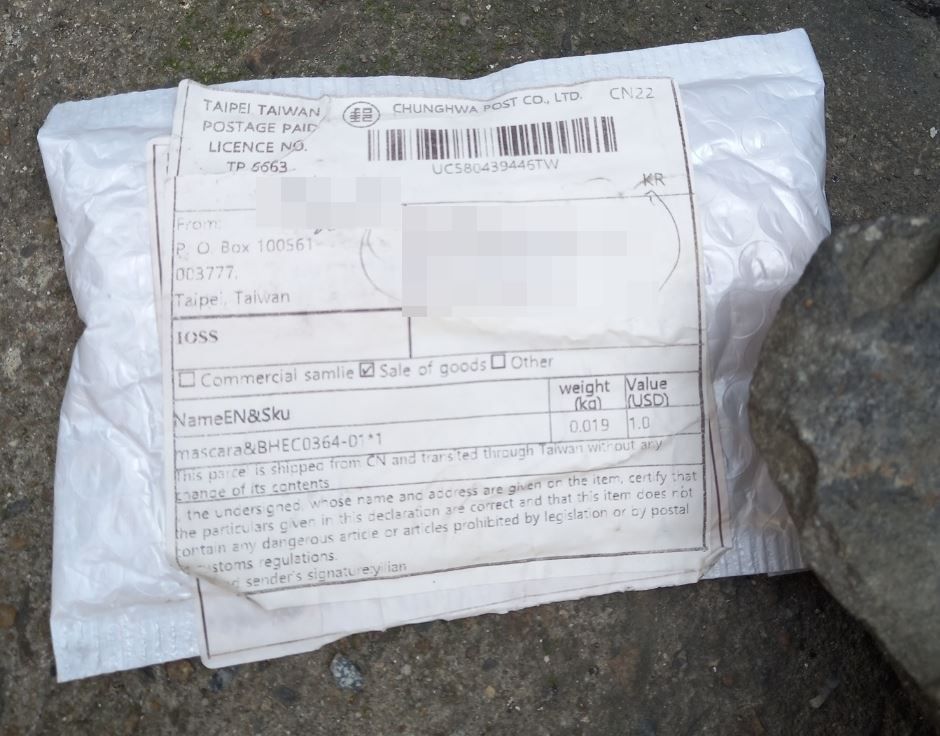Possible Chemical Terrorist Acts Unleash Fear as Suspicious International Parcels received in Korea
Last Thursday, a concerning news report surfaced regarding a series of potential terrorist acts involving toxic chemicals that continued to unfold over the weekend. An intense investigation was initiated after hundreds of unrelated addresses in Korea received suspicious international packages, raising nationwide alarm.
In response to the escalating situation, the police urgently cautioned the public against opening parcels labeled with "CHUNGHWA POST," as they could potentially contain hazardous materials. As of now, authorities have identified over 640 such packages, all originating from Taiwan, that have been delivered to various locations across Korea, including Jeju Island, since the initial incident on Thursday. Each of these parcels is currently under meticulous scrutiny by law enforcement.

On Sunday, an X-ray scan of a package delivered to a residence in Cheonan, North Chungcheong Province, indicated the presence of a potentially harmful gas. However, further examination by the police revealed no such dangerous substance in the parcel.
Since the first report last Thursday, the mysterious parcels have instilled fear and confusion among the public. At a care center for the disabled in Ulsan, three staff members reported dizziness and difficulty breathing after opening one of these parcels. Subsequent investigation by the Agency for Defense Development concluded that the box contained nothing unusual.
The situation escalated further the next day when a similar package arrived at the Seoul Central Post Office, prompting the evacuation of 1,700 individuals until authorities confirmed the area's safety.
Police disclosed that upon examination, the parcels were found to be empty or containing low-value commercial products, such as lip balm. However, the peculiar circumstances of their delivery continue to baffle investigators.
The Taipei Mission in Seoul revealed that their investigation traced the origin of the Ulsan package back to China, which was then transshipped to South Korea via Chunghwa Post, Taiwan's postal service. Most of these suspicious packages bear the sender information, "P.O. Box 100561-003777, Taipei Taiwan," potentially suggesting a common source in China.
In response to the escalating situation and to address concerns in both Korea and Taiwan, principal deputy national security adviser Kim Tae-hyo convened an emergency meeting of the National Security Office. Representatives from various state agencies, including the police, Ministry of Foreign Affairs, and the National Intelligence Service, were present to formulate a comprehensive response.
In light of the ongoing investigation and the complex international dimension of the case, Korea's foreign ministry reached out to its Chinese counterpart, requesting full cooperation in the probe. The Chinese authorities have expressed willingness to assist in resolving the matter and have established close communication with their Korean counterparts.
As the investigation progresses, the Korean public remains on high alert, and authorities are working diligently to determine the motives behind these peculiar and unsettling occurrences.
Anthrax Scare in South Korea (2010)
In 2010, South Korea faced a significant anthrax scare when several government offices received suspicious packages containing white powder. Among the targeted locations were the National Defense Ministry, the U.S. Embassy in Seoul, and the office of President Lee Myung-bak. The incidents triggered immediate panic and heightened security measures in these areas.
Authorities swiftly responded by quarantining and thoroughly examining the affected offices. The packages were later confirmed to contain harmless substances, likely meant to incite fear rather than pose an actual threat. Nonetheless, the incident raised concerns about potential biosecurity threats and prompted authorities to reevaluate their security protocols to prevent similar occurrences in the future.
Chemical Mail Attacks in Japan (1994)
In the mid-1990s, Japan experienced a series of chemical attacks through the mail system. The notorious Aum Shinrikyo cult orchestrated these attacks, intending to unleash terror and chaos. On one occasion, parcels containing deadly sarin nerve gas were sent to various government offices and media organizations.
One of the most infamous incidents occurred in Matsumoto, Nagano Prefecture, in 1994 when Aum Shinrikyo released sarin gas in a residential area. The attack resulted in several fatalities and a significant number of injuries.
The cult's attempt to spread panic through mail-based chemical attacks had far-reaching consequences, leading to heightened scrutiny of postal systems and security measures across Japan. The authorities implemented strict protocols to detect and prevent similar acts of terror, emphasizing the importance of vigilance and cooperation between government agencies and the public.
Parcel Bombs in the United States (2018)
In the United States, a series of parcel bomb attacks struck various locations in 2018. The perpetrator sent several homemade explosive devices to prominent figures, including politicians, celebrities, and media organizations.
The incidents, occurring over a short period, created a sense of unease and heightened security concerns throughout the country. Law enforcement agencies conducted extensive investigations to identify and apprehend the culprit behind these dangerous acts.
Through the collaborative efforts of federal and local law enforcement, the suspect was ultimately arrested, and the wave of parcel bomb attacks came to an end. The incidents served as a stark reminder of the potential dangers posed by mail-based terrorism and reinforced the need for stringent security measures in handling and inspecting packages.
These examples demonstrate how incidents involving suspicious packages and potential terrorist acts have occurred both in Korea and abroad. Such occurrences underline the importance of constant vigilance and proactive security measures to safeguard the public from potential threats.

